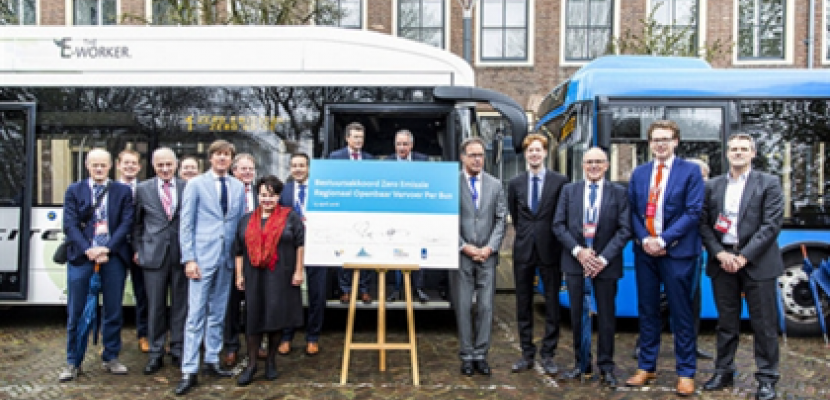Image

National Administrative Agreement Zero Emission Buses (BAZEB) in 2016 in the Netherlands
Published on 12 December 2021

Netherlands
This is the good practice's implementation level. It can be national, regional or local.
About this good practice
In the Netherlands, only small numbers of new zero emission (ZE) busses where introduced before 2016, and there were barriers in scaling up ZE-buses to solve climate and pollution problems. In 2016 all 14 Dutch regional public authorities and the Ministry of Transport agreed on the following targets:
• all newly deployed buses are Zero Emission in 2025 or earlier;
• in 2030 all PT-buses in the Netherlands are Zero Emission
For the Netherland -with more than 5.000 PT-buses- this was in an ambitious goal; also in a EU or worldwide perspective. Part of the agreement is to work together on an annual agenda (share results and best practices, experiences, monitoring, financial instruments, funding and joint research). So far, the agreement has made a big difference in the expansion of ZE-buses and has also set clear targets for all public transport companies (public/private) and the bus manufacturers. In 2020, the 1.000th ZE-bus was operational and the Netherlands became by far the leading EU-nation in ZE-buses.
Due to better preparation and overview, the transition to zero emission buses is more likely to be a success, costs and the risks of encountering unexpected obstacles are reduced. Identified synergies will improve the transition further.
• all newly deployed buses are Zero Emission in 2025 or earlier;
• in 2030 all PT-buses in the Netherlands are Zero Emission
For the Netherland -with more than 5.000 PT-buses- this was in an ambitious goal; also in a EU or worldwide perspective. Part of the agreement is to work together on an annual agenda (share results and best practices, experiences, monitoring, financial instruments, funding and joint research). So far, the agreement has made a big difference in the expansion of ZE-buses and has also set clear targets for all public transport companies (public/private) and the bus manufacturers. In 2020, the 1.000th ZE-bus was operational and the Netherlands became by far the leading EU-nation in ZE-buses.
Due to better preparation and overview, the transition to zero emission buses is more likely to be a success, costs and the risks of encountering unexpected obstacles are reduced. Identified synergies will improve the transition further.
Expert opinion
Decarbonisation of the transport sector is a goal for public authorities across Europe, and this practice demonstrates an excellent approach for guiding the roll-out of zero-emission buses. Signing up to agreements and targets demonstrates a long-term orientation and commitment which is important for communication and stakeholder engagement. The joint actions for experience sharing, study preparation and creation of monitoring tools are also a best practice, demonstrating the benefits of collaboration and co-operation amongst authorities. The replication potential is high in other countries and regions where there is a central actor able to act as a driver and coordinator.
Works at
Interreg Europe Policy Learning Platform
Resources needed
All partners contribute to the BAZEB working agenda with a maximum budget of €300.000 every year. About 75% of this amount are spent on study-projects and developing (monitoring)tools. The rest of the resources are required for the secretariat, communications and evaluation.
Evidence of success
-In 2021 23,5% of the busfleet in the Netherlands are ZE-buses (1276 in total). The percentage of ZE-buses compared to the total was in 2019 40% in the Netherlands.
-In 2015 only 3% of all new buses in the Netherlands were ZE.
-In 2020 20% of all used energy for buses was renewable.
- The CO2-mission per buskilometre in 2017 was 0,9 kg; this was reduced to 0,74kg in 2020
-Cooperation with the private market
-Economic benefits in ZE-project by scaling up
-Sharing knowledge on ZE-topics
-In 2015 only 3% of all new buses in the Netherlands were ZE.
-In 2020 20% of all used energy for buses was renewable.
- The CO2-mission per buskilometre in 2017 was 0,9 kg; this was reduced to 0,74kg in 2020
-Cooperation with the private market
-Economic benefits in ZE-project by scaling up
-Sharing knowledge on ZE-topics
Potential for learning or transfer
Political agreement has helped a lot given the governance construction this might also be transferable. Once that is in place other aspects can help ZE bus further along. Such as sharing information, standard TCO etc. TCO is transferable as are others tools that have been development. Meeting every other month with all PTA ZE bus experts is also something that can be done in other countries and regions.
Further information
Website
Good practice owner
You can contact the good practice owner below for more detailed information.
Organisation
Province of Utrecht

Netherlands
Utrecht
Contact
Province of Utrecht
